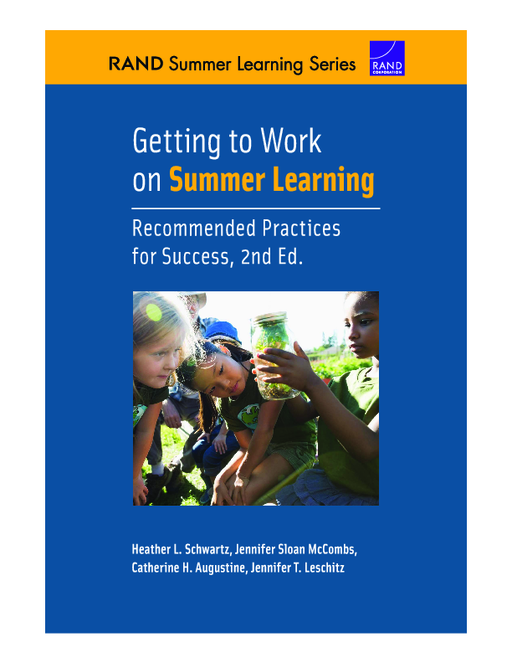- Author(s)
- Heather L. Schwartz, Jennifer Sloan McCombs, and Catherine H. Augustine
- Publisher(s)
- RAND Corporation
- DOI Link
- https://doi.org/10.7249/RR366-1
Research Approach
This report distills lessons from a six-year study of voluntary summer learning programs in five urban school districts (Boston; Dallas; Duval County, Fla.; Pittsburgh; and Rochester, N.Y.). From summer 2011 through summer 2014, researchers from the RAND Corporation collected more than 1,200 surveys of summer instructors and 10,000 surveys of elementary grade students, conducted 900 interviews, and observed more than 2,000 hours of classroom and enrichment activities.
The Wallace Foundation asked RAND to conduct formative evaluations of the programs over two summers (2011 and 2012) so that districts could make successive improvements to their programs before 2013. In that year, RAND launched a randomized controlled trial with slightly more than 5,600 students who had applied to attend two consecutive summer programs (2013 and 2014). The study examined the short and long-term effects of the programs and the characteristics of the programs that were effective. RAND also continued to provide formative feedback to each district during summers 2013 and 2014.
The recommendations in the report are informed by both the student outcome findings and data gathered during and after the four years of program implementation.
Implementation data included:
- Interviews with district leaders, program leaders, school and site leaders, curriculum coaches, academic teachers, enrichment teachers, leaders of the organizations providing enrichment, and teacher aides.
- Surveys conducted in each of the four summers of all academic teachers, plus enrichment instructors in summers 2011 and 2012.
- Observations of summer program activities. In summers 2013 and 2014, a RAND observer followed each classroom of students for one full day, creating a minute-by-minute time log of the program’s mathematics, ELA, and enrichment classes. A daily site survey was added in summer 2014 with questions about the climate and organization of the site.
- A curriculum review by two elementary education professors who examined the quality of the written ELA and mathematics curricula used in 2011. In 2012–2014, curriculum experts providing technical assistance to the initiative reviewed the districts’ summer curricula.
- Analysis of student attendance records after each summer, along with summer 2014 program expenditure and revenue data.








